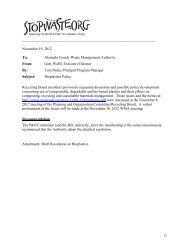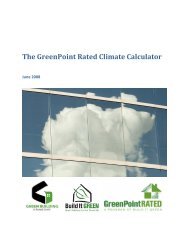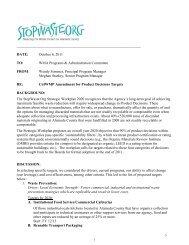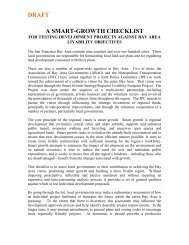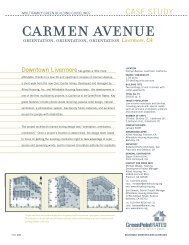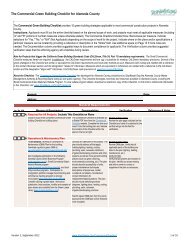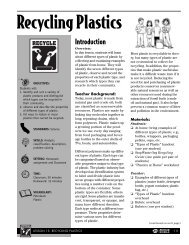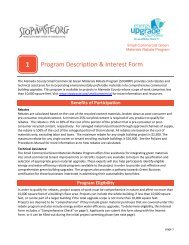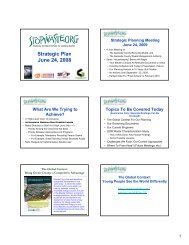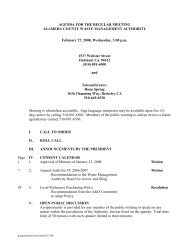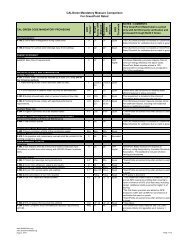Summary of Composting Survey Conducted in ... - StopWaste.org
Summary of Composting Survey Conducted in ... - StopWaste.org
Summary of Composting Survey Conducted in ... - StopWaste.org
Create successful ePaper yourself
Turn your PDF publications into a flip-book with our unique Google optimized e-Paper software.
RDDOf the 76% <strong>of</strong> the RDD sample who are not composters, 70% have not composted <strong>in</strong> the past. Asignificant amount, 22%, had composted <strong>in</strong> the past; these respondents mostly composted for oneto five years (35%) or for more than ten years (29%). Of these non-composters, 11% report thatthey nevertheless own b<strong>in</strong>s or have a pile; most (45%) report purchas<strong>in</strong>g their b<strong>in</strong>s “at a discountthrough the county.” The top reasons these respondents no longer compost are “no reason”(19%), that it is <strong>in</strong>convenient (14%), they don’t need compost (13%), and pests (11%).Likely (Target) Composters from RDD SampleIn order to learn which current non-composters <strong>in</strong> Alameda County are the likely futurecomposters, EMC created a segmentation <strong>of</strong> the RDD sample. This segmentation is based onrespondents’ answers to a series <strong>of</strong> eleven statements <strong>of</strong> positive and negative statements aboutcompost and compost<strong>in</strong>g.Likely Composters Less Likely Composters Unlikely Composters (Current Composters)(n=350)17%38% 21% 24%0% 20% 40% 60% 80% 100%The target group, or ‘Likely composters’ comprises 17% <strong>of</strong> the RDD sample (n=60). TheseLikely composters have consistently positive views about compost<strong>in</strong>g, but do not currentlycompost. Likely composters see themselves as environmentalists, and 25% rank themselves a 7(“Strong Environmentalist”) on the environmental scale. Like the overall sample, the target iss<strong>in</strong>gle-family home dwellers. The target is also those who are more settled at their address,tend<strong>in</strong>g to live at their address for eleven years or longer (57%). Furthermore, these likelycomposters tend to be slightly less well educated than the overall sample, with 49% <strong>of</strong> the targethav<strong>in</strong>g not attended or not completed college, compared to 41% <strong>of</strong> the overall <strong>in</strong> that samecategory. While 22% <strong>of</strong> the target have tried compost<strong>in</strong>g <strong>in</strong> the past, the vast majority (77%)have never composted <strong>in</strong> the past.Likely composters are currently very <strong>in</strong>volved <strong>in</strong> us<strong>in</strong>g food scrap/yard waste programs asevidenced by their responses to questions about methods <strong>of</strong> disposal; they are currently dispos<strong>in</strong>gmost <strong>of</strong> their food waste (45%) and yard waste (83%) <strong>in</strong> either food scrap pails or yard wastecarts. It is both good and bad that this group currently uses the Food Scrap Recycl<strong>in</strong>g Program;it is encourag<strong>in</strong>g that they are already divert<strong>in</strong>g their waste, but they may not see the need tobeg<strong>in</strong> compost<strong>in</strong>g.Page 21ACWMAEMC 05-3307<strong>Compost<strong>in</strong>g</strong> <strong>Survey</strong> <strong>Summary</strong> (Draft)




